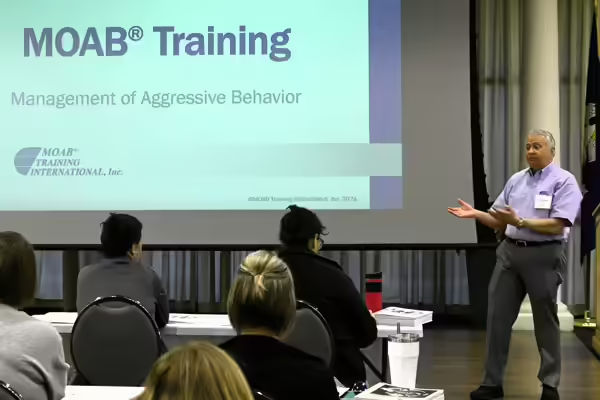The MOAB® Approach to Employee Empowerment
How does MOAB Deescalation Training work?
First, we train course participants in the principles, techniques, and skills needed to recognize, reduce, and manage anxious, aggressive, or violent behavior in the workplace. In-person training options range from half-day basic de-escalation courses to multi-day courses that cover more advanced physical self-defense tactics.
MOAB courses include “train-the-trainer” instructor-level courses, basic-level onsite workplace violence prevention training programs, and custom corporate de-escalation seminar solutions.

INSTRUCTOR-LEVEL TRAINING
If course participants choose to take instructor-level courses, they can become certified as MOAB instructors and receive authorization to provide MOAB deescalation and conflict management training to team members of their own. Here’s an example:

Team members from a large hospital take the instructor-level MOAB courses most suited to their organization’s needs and become certified as MOAB Training instructors.

Based on what they have learned, and using MOAB training materials, these individuals train their personnel on the best ways to manage aggressive behavior that may take place at their hospital.

All trained hospital staff have now gained the confidence and acquired the skill sets needed to safely and decisively address and handle the challenges of aggressive behavior from patients, visitors, or coworkers.
How is MOAB different from similar programs?
The MOAB approach goes beyond the basics. We address a multitude of behavioral crises and teach you how to deal with each stage of conflict. Every one of our workplace behavior training techniques—whether verbal, nonverbal, or physical—is based on solid, proven principles that deliver on 5 real-world objectives:

LEARN SPECIALIZED SKILLS
We teach principles, techniques, and skills that can be used to recognize, reduce, and manage aggressive or violent workplace behavior. These can include physical de-escalation skills.

BE EFFECTIVE BUT COMPASSIONATE
We provide effective and compassionate methods of successfully dealing with anxious or aggressive people, and managing aggressive behavior.

BE PERSONALLY EMPOWERED
We help people gain personal empowerment through increased confidence and skills that can be used during threatening workplace situations.

MINIMIZE RISK TO YOURSELF & OTHERS
Our techniques and tactics are all designed to minimize the potential for injury to you, bystanders, and the aggressive individual(s).

REDUCE FEAR & APPREHENSION
We help reduce fear in stressful workplace circumstances by increasing the ability to decisively and successfully react.
The Integration of Trauma-Informed Care (TIC)
The MOAB approach is also unique in that we maintain a focus on trauma-informed care (TIC) across all of our course programs. Integrating TIC into our approach means consistently acknowledging and addressing the impact of trauma on an individual’s life—understanding, recognizing, and responding to the effects of trauma to promote healing and prevent re-traumatization. We do this in a number of ways:
Understanding Triggers: Trauma survivors may have triggers—situations or stimuli—that remind them of past traumatic events, leading to heightened emotional reactions. De-escalation training with a trauma-informed approach helps responders recognize and understand these triggers, enabling them to respond in ways that minimize re-traumatization.
Promoting Safety & Trust: Trauma survivors often struggle with feelings of vulnerability, fear, and mistrust due to past experiences. De-escalation techniques that prioritize safety, empathy, and respect can help build trust and rapport between the responder and the individual in crisis. This, in turn, can facilitate a more effective de-escalation process.
Avoiding Re-Traumatization: Traditional de-escalation methods may inadvertently re-traumatize individuals by using tactics that feel controlling, threatening, or disrespectful. Trauma-informed training teaches responders to prioritize nonthreatening communication, active listening, and empowerment, reducing the risk of re-traumatization during crisis interventions.
Empowering Choice & Control: Trauma survivors often feel a loss of control due to past experiences. Trauma-informed de-escalation approaches focus on empowering individuals to make choices and maintain control over their own bodies and decisions whenever possible. This can reduce feelings of helplessness and increase cooperation during crisis situations.
Cultivating Sensitivity & Compassion: TIC emphasizes the importance of empathy, sensitivity, and compassion when interacting with individuals who have experienced trauma. De-escalation training that incorporates these principles encourages responders to approach crisis situations with genuine care and understanding, fostering healing and recovery.
MOAB’s integration of TIC into de-escalation training equips responders with the knowledge, skills, and attitudes necessary to effectively support trauma survivors during moments of crisis while minimizing the risk of re-traumatization.

A NEW LEVEL OF CONFIDENCE
The MOAB approach is part of today’s most innovative, comprehensive, and effective aggressive behavior management program. Talk to us today and see how the MOAB program can give your staff the power to de-escalate potentially dangerous situations, control and restrain aggressive individuals, and create a more confident work environment for every one of your employees.